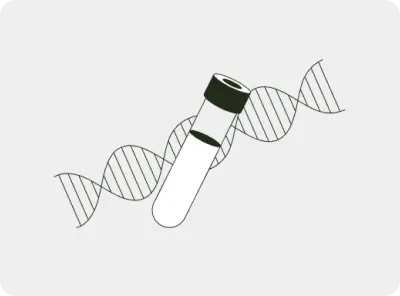Semen analysis from the comfort of home
Semen analysis from the comfort of home
Optimize your sperm health and chances of pregnancy
Get a new data point about your overall health
Easy at-home sample collection
You should test your sperm if:





You’re trying to grow your family (or might be soon).
If you’re trying to have a baby now — or even just thinking about it — testing for fertility can give you invaluable information to make your journey faster and easier.
You’re planning fertility treatment.
Fifty percent of infertility is attributable to sperm, and not just sperm count. An advanced sperm analysis can identify deep-rooted genetic damage in your sperm that may contribute to male infertility. It’s recommended before fertility treatment such as IVF.
You’re taking a medication that may affect fertility.
Medications such as testosterone or estrogen significantly reduce sperm production and can lead to male infertility. A sperm test helps you understand if freezing now is an option, or if you should pause your therapy first.
You want to understand your health more holistically.
Sperm health reflects how well your body functions, making it a biomarker for your overall health. Your sperm analysis test results are correlated to your risk for metabolic disease and even cancer.
You want to keep your options open.
An at-home sperm analysis can help you see where your fertility stands now, whether a family is in your immediate future or just a distant gleam in your eye. After testing for fertility, you can freeze your youngest, healthiest sperm before it begins to decline.
Sperm testing options
Semen volume
How much semen you’ve produced
Sperm concentration
How many sperm your semen contains
Motility
How many of your sperm are moving
Morphology
How many of your sperm are the proper size and shape
DNA fragmentation index
How many of your sperm contain damaged DNA

Standard semen analysis
Understanding his fertility starts here. Ideal for those who are just starting the process of trying to conceive.

Advanced semen analysis
Get in-depth insight into his sperm health. Recommended for men over 35, those who are planning IVF or IUI, and those with a history of miscarriage.
Included
Included
Included
Included
Included
Included
Included
Included
Not included
Included
Not sure where to start?
Should you check your fertility at home? Is sperm testing right for you? Take this easy 3-minute quiz to find out.
Get my recommendation
3-minute quiz
Freezing for
the future
You should freeze your sperm if:
Freezing for
the future
You should freeze your sperm if…
You want to keep your options open for the future.
You want to have the healthiest possible family.
You’re about to start a medical treatment, such as hormone therapy or chemotherapy.

You’re planning to have a vasectomy.
You’re in a profession with a high risk of injury or chemical exposure, such as the military or firefighting.
Learn more about sperm freezing
How to freeze your sperm with Legacy

How to test your
sperm with Legacy
1
Order your kit
2
Produce your sample at home and ship it back same-day
3
We’ll analyze your sample, and you’ll get results within 48 hours
4
Questions about your results? Schedule a consultation with a clinician
5
You can choose to freeze your sample for 1–10 years
The science of at-home
sperm testing
See how we do it

Safe travels
Our kit includes a clinically tested, FDA-approved sperm transport liquid. It stabilizes pH, prevents bacterial growth, and maintains semen samples during overnight shipping.

The most scientifically advanced at-home sperm test
Most at-home semen analysis kits only look at sperm count. Legacy’s sperm test analyzes every key metric of fertility: semen volume, sperm count, sperm motility, sperm morphology, and even DNA fragmentation.

A clinic-grade sperm health check
Legacy’s mail-in kit has been clinically tested and validated. Results are highly correlated to the results you’d get from a traditional one-hour sperm test.

Protecting your legacy
Your sample’s unique identifier is double-checked at every step. At Legacy, your semen sample is stored for you and you alone — never donated, sold, or experimented with.

Results anyone can understand
Our dashboard gives you more than just numbers. It offers comprehensive information on what your results actually mean, plus evidence-based recommendations for improving your sperm.
Everything is easier at home
With Legacy, at-home testing for fertility is faster, easier, and infinitely less awkward than a traditional clinic.
Legacy
Traditional clinics
Sample collection
From the comfort of home
In the clinic “collection room”
Metrics measured
Sperm concentration, motility, and morphology
Sperm concentration, motility, and morphology
DNA fragmentation analysis
Available as part of the
Advanced Semen Analysis
Maybe available (+$500)
Prescription required
No
Referral needed
Wait time for appointment
2 business days
2-4 weeks (or more)
Results available in
48 hours
1-2 weeks
Fertility consultation
+$150
+$300 or more
Option to freeze your sample
Starting at $145/year
Starting at $500/year
Frequently asked questions about sperm testing
Legacy’s analysis has been clinically tested and validated. That means that lab scientists have examined the results of our at-home sperm testing kit against the results of a traditional, one-hour analysis, and found them to be highly correlated (comparable). There is a slight decline in sperm motility as a result of shipping the semen sample; however, this decline will not affect results or the viability of the semen sample for most clients.
Legacy’s Standard Semen Analysis looks at all key metrics of sperm health, including:
Semen volume: How much semen you’re producing
Sperm concentration: How many sperm are present in your semen sample
Sperm motility: How many of your sperm are moving — a critical indicator of your sperm’s health and fertility
Total motile sperm count: The final calculation of your sperm quantity and quality, which is highly correlated to your chances of creating a pregnancy
Sperm morphology: How many of your sperm are the proper size and shape
Post-thaw analysis: We freeze and thaw a small portion of your sample to assess if it’s a good candidate for cryopreservation (sperm freezing)
Many at-home sperm testing options don’t look at sperm motility or sperm morphology, which are important parameters when understanding your fertility. We’re the only at-home sperm freezing option that includes a post-thaw sperm analysis.
Legacy’s testing for fertility does not include genetic testing or sequencing. Our analysis cannot determine your genetic code. The test can’t help you choose particular sperm for IUI or IVF treatment, or choose sperm with certain genetic characteristics, such as sex chromosomes.
Legacy’s Advanced Semen Analysis goes well beyond a simple sperm count. It looks at all the metrics measured in a Standard Semen Analysis — including semen volume, sperm concentration, sperm motility, total motile sperm count, sperm morphology, and post-thaw analysis — plus an additional parameter: sperm DNA fragmentation.
Sperm DNA fragmentation is a measure of the percentage of your sperm that contains broken or damaged DNA. The single role of your sperm is to carry your DNA to combine with the egg, creating the genetic code for your future child. Therefore, the health of the DNA inside your sperm is of utmost importance to your ability to have a healthy baby.
High sperm DNA fragmentation can contribute to infertility, pregnancy loss, and poor health outcomes for your future child.
You should complete sperm testing if:
- You’re trying or planning to have a baby. If you and your partner are trying to conceive or planning to get pregnant, a semen analysis is the first step to rule out male infertility issues. It’s never too soon — we recommend proactive semen analysis. Testing sperm early can help you avoid costly and unnecessary tests or treatments down the line, and can help you get more quickly to your goal of starting a family.
- You want to improve your fertility. Sperm takes about 72 days to produce. That means it will take at least 2 to 3 months for any changes you make to have a measurable impact on your sperm health. We recommend starting with a baseline sperm analysis, and then testing every 3 months to see if your healthier lifestyle, surgery, or medication is helping to improve your fertility.
- You might want to freeze your sperm. If you’re freezing your sperm for the future, start with a sperm analysis to ensure your sperm is healthy and fertile before freezing.
- You’ve had a vasectomy or vasectomy reversal. If you have a vasectomy for long-term birth control, you should get a semen analysis around 12 weeks after the procedure, to confirm there’s no sperm left in your semen. If you have surgery to reverse a previous vasectomy, we recommend getting a semen analysis every month for 12 months to ensure your sperm quality, sperm count, and sperm motility are recovering.
- You want an additional data point for your overall health. Your sperm health isn’t just related to male infertility; it’s considered a “biomarker” for your overall health. Sperm parameters are correlated with your risk for metabolic disease, cancer, and even death. For people looking to optimize their health holistically, a semen analysis report can share valuable information.
Anyone who wants a more thorough understanding of their sperm health may consider Advanced Semen Analysis. DNA fragmentation testing is highly recommended for the following populations:
- Infertility patients including:
- Patients with unexplained infertility
- Patients diagnosed with male-factor infertility of an unknown cause
- Patients with a history of pregnancy loss
- Patients with poor embryo quality during IVF treatment
- Anyone who plans on utilizing IVF
- Others:
- People over 35
- Those with a history of cancer
- Those under treatment with prescription medications
- People who have had a vasectomy reversal
- People with lifestyle habits that may affect sperm health, such as smoking
First of all, don’t panic! An abnormal result — such as a low sperm count, low sperm morphology, or low sperm concentration — doesn’t mean you have male infertility, or that you’ll never be able to have children without assistance.
If you get abnormal results, we recommend meeting with a fertility specialist to review the numbers, your lifestyle and medical history, and your family plans. Legacy offers virtual consultations with a fertility clinician as an upgrade option, or you can speak directly with the clinician who referred you to Legacy (if applicable).
There may be lifestyle adjustments you can make to help improve your fertility, or additional testing that may be suggested by your sperm analysis results.
Legacy’s convenient mail-in collection kit allows you to produce your semen sample for sperm testing in the comfort of your home. A sperm transport liquid protects sperm health while it’s in transit, minimizing the impact on sperm quality. Research shows that sperm concentration is not affected by shipment, and sperm motility declines by less than 0.4% per hour in transit.
After you send your sperm to Legacy for semen analysis, we will test it for the metrics you have chosen. If you have indicated you may want to freeze your sperm, we will do an initial freeze.
We’ll then thaw a small portion of your semen sample and re-analyze it to ensure your sperm are viable after freezing — this is known as a post-thaw semen analysis.
We’ll keep your semen sample in short-term storage, after which you can either choose long-term storage, or we will discard your sample. Legacy will never sell, donate, or experiment with semen samples.
In most cases, yes! If your sample is viable for freezing, you have a period of time after receiving your results to choose a freezing plan.
The cost of sperm testing with Legacy is less than you might think! Semen analysis starts at $295, including shipping, and may be covered by your health insurance or fertility benefits provider.
Legacy is in-network with several health insurance companies (including Aetna, Cigna, EmblemHealth, TriWest, and UnitedHealthcare) and fertility benefits providers (including Carrot, Progyny, Maven, Stork Club, and WINFertility). Check your employers summary of benefits, or check your eligibility here.
About us
Discover our mission and the humans behind Legacy.


